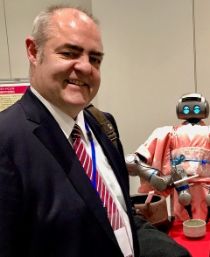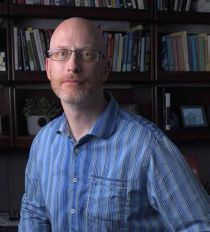AIDEM 2021 2nd International Symposium on Artificial Intelligence for Prevention & Intervention in Dementia Care
29 October, 2021, virtual
Topic
The AIDEM 2021 Symposium is organised as a technology-focused satellite event of the 3rd Krems Dementia Conference.
AIDEM 2021 investigates the emerging use of intelligent assistive technologies available to caregivers and older adults with cognitive deficits and explores the challenges in socioeconomic status and technological literacy as well as ethical and legal implications that should be considered in the design and development of the technologies.
Drawing from existing state-of-the-art, AIDEM will suggest novel technologies and services for the design and adoption aimed at increased and equitable access for this vulnerable population.
AIDEM welcomes contributions on Artificial Intelligence in various segments of dementia research and services, topics of interest include but are not limited to, AI-based monitoring to explore early changes in dementia progression, biomarker identification for prevention and early detection, assistive technologies and intervention, multimodal analytics of interaction, AI and modifiable risk factors, AI and recommender systems in dementia, big data analysis in the context of dementia prevention, monitoring & intervention.
The second (2021) edition of the AIDEM Symposium presents international Keynote speakers from Japan, United States and Germany, as well as contributions from other European countries, and includes demonstrations from companies that provide assistance technologies in the context of dementia care.
Program1
|
09:30 |
Welcome Note Lucas Paletta, Sandra Schüssler, Björn Schuller Co-chairs |
|
09:40 |
KEYNOTE Presentation of the EU-Japan Project E-VITA, a Virtual Coach for Smart Aging Lorenz Granrath Smart Aging Research Center (SARC), Tohoku University, Sendai, Japan |
|
10:20 |
The Treacherous Language of Alzheimer: Exposed by Agent AI Björn Schuller University of Augsburg, Germany |
|
10:40 |
Social Robot Pepper Coaches and Promotes the Quality of Life of Persons with Dementia: The AMIGO Study Sandra Schüssler Medical University of Graz, Austria |
|
11:00 |
On the Use of Sensor Technology for Early Notification of Stress in People with Impaired Cognition Erwin Meinders Mentech Innovation B.V., Eindhoven, The Netherlands |
|
11:20 |
KEYNOTE Using AI to Move Towards Better Individualized Treatment Holger Fröhlich Head of AI & Data Science Group, Deputy Head of Department of Bioinformatics, Fraunhofer SCAI, Sankt Augustin, Germany |
|
12:00 |
Break |
|
13:00 |
Dementia Risk Reduction: Applied Epidemiology and Public Health Kay Deckers Maastricht University, The Netherlands |
|
13:20 |
Multimodal Interventions for Persons with Age-related Cognitive Impairment in Long-term Care Settings Nicoleta Saran digitAAL Life GmbH, Graz, Austria |
|
13:40 |
Virtual Technologies and Eye-Tracking Measurements for Mindfulness and Activation in Long-Term Care Lucas Paletta Joanneum Research, Graz, Austria |
|
14:00 |
Memorytainment as an Assistive Technology Approach Margarita Letsou Kosmas o Etolos ECU, Saloniki, Greece |
|
14:20 |
Break |
|
14:40 |
Demo Session, Introduction Lucas Paletta |
|
|
Demo #1: digitAAL Life GmbH (Graz, Austria) |
|
|
Demo #2: CogVis GmbH (Vienna, Austria) |
|
15:30 |
KEYNOTE Old Brains, New Tricks: Can Environmental Enrichment Improve Aging Memory Craig E. L. Stark James L. McGaugh Chair in Neurobiology of Learning and Memory, Professor, Department of Neurobiology and Behavior, Director, Facility for Imaging and Brain Research (FIBRE) & Campus Center for Neuroimaging (CCNI), School of Biological Sciences, University of California, Irvine |
|
16:10 |
Goodbye note & end of Symposium Lucas Paletta, Sandra Schüssler Co-chairs |
Organisation
|
Chairs |
Lucas Paletta |
Joanneum Research, Austria |
|
|
Sandra Schüssler |
Medical University of Graz, Austria |
|
|
Björn Schuller |
University of Augsburg, Germany |
|
Local Chair |
Stefanie Auer |
Danube University Krems, Austria |
|
Demo Chair |
Maria Fellner |
digitAAL Life GmbH, Austria |


